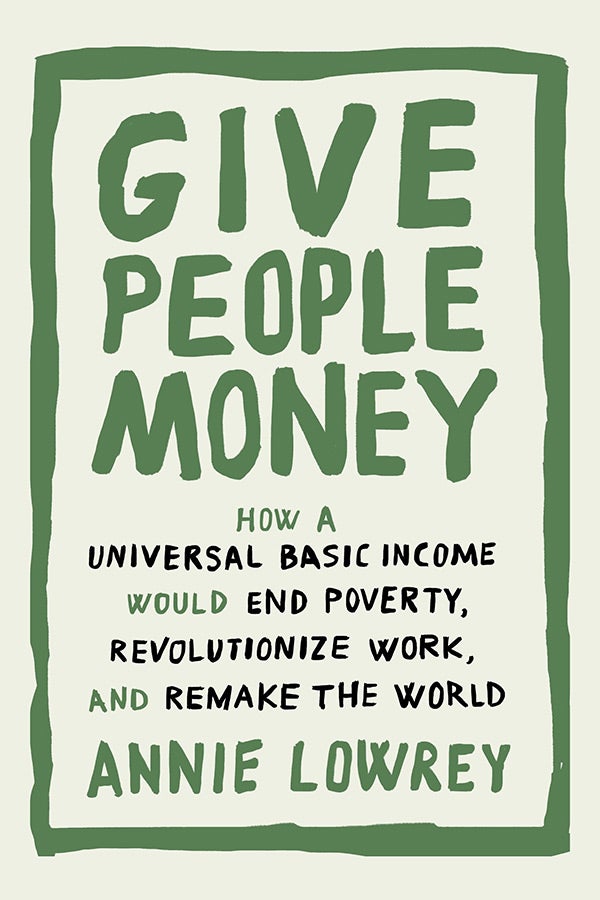In an age where every day brings more doomsday forecasts of massive technologically driven unemployment, from driverless cars to A.I. robots as caregivers, journalist Annie Lowrey set out to answer a question: Is it possible to live in a world where we get what she calls “wages for breathing”? This week her findings come out in Give People Money: How a Universal Basic Income Would End Poverty, Revolutionize Work, and Remake the World. We spoke about what the idea of giving every American cash—no strings attached—would mean for work, gender inequality, and American identity, and whether it’s actually a policy that could pass in the U.S. given the current climate of tying even the most basic benefits to paid work.
This interview has been condensed and edited for clarity.
Alieza Durana: A lot has been said and written about Universal Basic Income. Why did you want to write a book about it? What was being missed in the conversation you wanted to add with this book?
Annie Lowrey: UBI is a really old idea, and while there’s been quite a bit written about it, there hasn’t been one that came from a reportorial place rather than a strongly argued place, from a particular viewpoint or reason they want to see the policy come into effect. For instance, Charles Murray, the libertarian who wrote In Our Hands, wants to see a much radically smaller government. Or Andy Stern wants to see an increase in worker power and wages, as a labor leader with the SEIU. There’s evidence for UBI from lower-income countries, and a lot of the data from Brazil, Mexico, India, Uganda, and Kenya. I wanted to tie those threads together and question what we know about how governments and societies support people.
You write about the deprivation, stigma, and social exclusion of poverty. How does UBI address these issues, especially in the context of a diverse society like the United States?
Amartya Sen, who is a Nobel laureate and welfare economist, puts forth an understanding of poverty as deprivation, and development as capability expansion. Poverty is not just a number: It’s a measure of how much you can participate in society and live a good life. In the U.S., we think in different terms—it’s numerical, using dollars to see if basic needs are met. In the U.S. we don’t take that view [of a good life] at all—we have a fragmented safety net, designed to identify specific life events, or prevent against certain forms of deprivation.
Medicaid, for example, is just designed to give access to health care, and food stamps nutritional assistance—even though there’s some evidence that they don’t eliminate nutrition problems among kids. They eat less at the end of the month than at the beginning.
So one thing about UBI is that it’s holistic—what do we need to make sure everyone, including children, the differently abled, literacy challenged, rural populations, are able to take part in life? How do we provide base opportunity to folks and eliminate deprivation? It’s not that I think UBI is an answer to the question, but it forces you to pose the question: What do you owe people, and how do you make sure people aren’t impoverished again in the more philosophical sense? UBI raises this more broad, interesting question about what deprivation and poverty mean. So it’s not to say that the monetary sense isn’t important. Money does buy opportunity, but it’s unidimensional. And if you take a pragmatic, holistic view of well-being, the U.S. does really horribly.
One of the things you mention is how care work—taking care of kids, the elderly, even just able-bodied adults—is underappreciated and undervalued. Why is it important to speak about UBI in this context?
If you think about economics as measuring purely economic transactions—there’s a famous quote about how a man who has married his mistress has reduced GDP since he’s no longer paying her. There is a big difference between work, and work as it’s measured in the economy. We know women do the lion’s share of important household and care work, and it’s either not compensated or compensated poorly. There’s long been a strain in feminist thought questioning whether we should pay women for the work they do that’s the most essential to the society and the economy.
UBI gives women something of a choice: Do I take UBI and do care work? On top of that, because care work is so undercompensated and so many women, and particularly women of color, work for poverty wages taking care of kids, the elderly, and as physician assistants in hospitals, what would it mean to boost their wages with $1,000? You could refuse a job that is low pay and has bad working conditions.
There’s already a crisis in the care of small kids, and as more and more of the economy becomes a care economy, there’s going to come a tremendous need for care work. UBI is one way to radically solve a number of problems at once.
It’s highly unlikely the U.S. will do this, but there are many ways to address and fix the problem: higher minimum wages, immigration reform. This a way to step back and recognize maybe part of the problem is that we don’t see all work as equal. And there are a number of men and women doing this essential work and making economic decisions for essential work in ways that are unseen and undervalued.
Do you really think UBI is possible? What would it take to get there, especially in the current U.S. context of work requirements for every social benefit?
The U.S. is moving in the opposite direction—away from simple benefits given in cash and/or universally. Paul Ryan and Donald Trump are remaking the safety net in the model of TANF, or welfare, where everything is contingent on a number of requirements, particularly work requirements.
I think there would be tremendous opposition to UBI from folks on the right and left because it’s contrary to our culture. The way our system has been set up has to do with our racial and political history. I’m under no illusions I think this is happening. I think if you started to see real economic change driven by robots and A.I., this might become more palatable.
Yet there are a number of measures informed from UBI that would be good and might be popular, like a universal benefit for children like France has to eliminate child poverty. There are even libertarian and conservative members from the House and Senate that have shown interest like Marco Rubio and Mike Lee. Expansions of the Earned Income Tax Credit is another solution that might be possible and a lot of Democrats might push for. Medicare for all, the idea of a simple universal program, is animated by the same principle.

One thing that no one is talking about, that there’s evidence for, is the negative income tax: The tax code would bump people up to a certain income level, make sure no one paying taxes would ever fall below a certain income. Luke Shaefer and his co-authors have put forward a proposal no one is talking about.
The big thing I’m currently looking at is the opposite or converse policies. We’ve never had work requirements in Medicaid but as of July 1, Kentucky will have them, and seven states are considering them. Current House and Senate bills have introduced work requirements for food stamps. There’s also this promise from the Trump administration to attach work requirements to Section 8 and other HUD programs. We know a lot about work requirements, but at the same time, we don’t know how it’s going to look when programs that never had them suddenly do. If there’s a[n economic] downturn, there’s a chance the requirements will be utterly devastating to the programs if there aren’t ways to opt out. Often if local unemployment goes over a certain rate, work requirements will be lifted. There are many ways to imagine it not going well. Work requirements increase stigma and people will drop out because of the hassle, because they do not qualify, and because of stigma. The people who have the biggest barriers are the most fragile and will find it hardest to comply.
On the Democrat side, there’s interest in simple automatic programs. There’s been fascinating research on people on the Obamacare exchanges who resent people on Medicaid. It turns out lower-income families on exchanges don’t get why they’re paying higher premiums when even-lower-income families don’t have to. Think about Social Security, and how much people love it. You sign up, and you get a check. 2020 candidates are discussing Medicare for all, free public tuition, and all of those ideas are animated by the same principles as UBI. The Clinton team had a proposal to change TANF, what most people think of when they think of welfare, to a direct cash benefit to children—instead of a work requirement for their moms. TANF is an underfunded and ineffective program.
Even places like Finland and Sweden are now thinking about means-testing benefits (or tying benefits to particular incomes or life events). What does that mean for UBI?
In those countries, you have such a safety net, one that’s provided for a long time for diverse circumstances. You lose your job or have a baby, and you get one to two years of payments. So means testing in those contexts is different. If you means test but the categories are broad, and the money is generous, you don’t run into the same problems like in the U.S.; here we decide able-bodied childless adults deserve nothing. We let kids be poor, where other countries don’t. There’s so much interest [in UBI] in Western Europe—in the countries that need it the least—there are very few poor people in Finland. They’re interested because it may be simpler, which is different from why developing countries are interested.
You talk about how American identity is tied to paid work. Does a world with UBI require us to find meaning from other types of work?
It’s heavily culture—in reading jobs’ wage labor, I discovered it’s a relatively recent phenomenon—they’re recent mutable social and cultural constructions. The European nobility didn’t work or have jobs: You can watch any costume drama and shows with people playing the harp and reading.
Is it impossible to imagine a society where we value art, gardening, community service, and let robots do the work? American identity is tied in with jobs. In poverty expert Luke Shaefer’s work, even low-income moms valorize work even though it’s often not possible for them to work. It’s hard to look forward and imagine in 500 years things will be different. It would take a deep-seated cultural shift, but that’s not to say it’s some immutable end-all, be-all.
